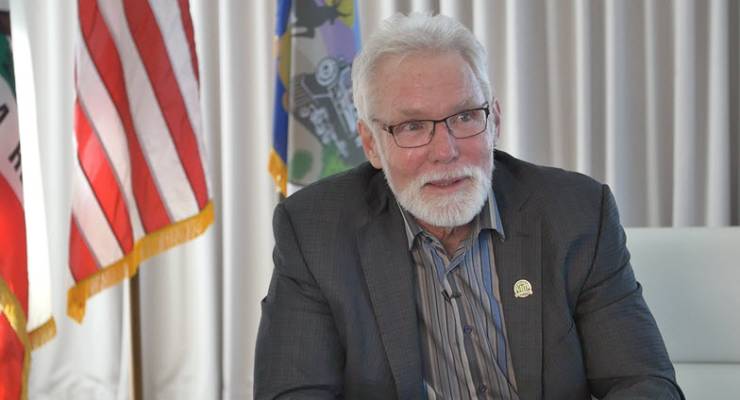
This is the second installment in a two-part series. Read part one — “What does it take to turn a city green?” — here.
Following the success of Lancaster Mayor Rex Parris’ alliance with Chinese electric vehicle and solar storage company BYD, the town has gone gung-ho for renewables: all new houses built in the city are required to include solar panels, street lights have been replaced by BYD’s LED bulbs, and almost every public building is powered by solar, from City Hall to the minor-league baseball stadium. The day I’m in town, they’re trialling another first for North America: electric vehicle chargers purpose built by German company EV Charging to hook into street lamps, a system designed to mitigate both infrastructure costs and the “range anxiety” associated with electric vehicles.
But arguably the most important of Parris’ green policies is Lancaster Choice Energy (LCE), a program established in 2015 under California’s system of community choice aggregation (CCA). Cities and counties across the state are allowed to directly purchase or generate energy and, through existing transmission services, sell it directly to residents and local businesses.
Residents can opt out of CCAs, but the system is attractive for both encouraging renewable energy adoption, with LCE offering a base product of 35% renewable energy and an upgrade to 100% wind power, and, even accounting for transmission surcharges set by California’s struggling utilities, often setting more competitive rates.
While his aides sing his praises and BYD workers are proud “to be part of something great,”, Parris’ brand of ruthlessness has unsurprisingly made him a polarizing figure in Lancaster; rivals decry his “control fetish,” how he “rules by fear and money” and has “basically killed the whole concept of democracy in Lancaster”.
Because even more dogged than Parris’ green policies are his attempts to reduce crime, which have included offering homeless people free one-way trips out of town, putting bounties out for the conviction of gang members; and, in a slightly more eugenical example, concentrated efforts to increase the town’s Asian and LGBTIQ populations.
“It required a level of ruthlessness they hadn’t seen before, but I had twenty-four kids die the year I got elected; from parties, gang shootings,” he said “Two years later, nobody died.”
“Was it ruthless? It was absolutely ruthless, but it brought it right down. And that gave me credibility.”
And crime dropped in Lancaster since Parris was first elected in 2008, although his claim of “24 to 0” homicides in two years is closer to “10 to 7”. But whatever the ethics or effectiveness of his social policies, they aren’t what’s put his town of 160,000 on the map.
A Facebook group with 937 members, “Get Parris Out of Lancaster”, regularly tracks city council meetings and the mayor’s attacks on social housing and homelessness. Notoriously, Parris also put out a pamphlet labelling an African-American mayoral rival as a “gang candidate” simply for opposing Parris’ social policies.
Parris has also been blacklisted by the Republican think tank The California Club for his climate stance, attracted a failed lawsuit from the ACLU by instituting prayers in city council meetings, been subject to a Red Scare-style scare campaign from Democrat rivals, and used tax regulations as a superficial means of shutting down a hotel that planned on hosting a motorcycle gang.
For his part, the mayor has apologised for the pamphlet, but that’s about it. He says he’s prepared to withstand the accusations, and even eventually be voted out, on the basis he’ll have brought renewables, safety and business to the town.
In this way, Parris functions as a microcosm for conservatism. His social efforts display a galling lack of respect for civil liberties, while his economic policies have inarguably boosted local business; city council says unemployment has fallen from 24% to 4-5% since he came to power roughly a decade ago.
Parris talks about renewable business as redefining America, although he says he’s after it regardless of the economic savings.
“This isn’t a social program, this is about the survival of our grandchildren,” he said. “And everybody knows that.”
“The urgency of it is such that I don’t want to be hindered by the democratic process. And so far, that’s worked out very successfully.”
*The reporter travelled to California with the Climate Council Australia.








Lancaster is comparatively lucky to have a complete wanker with a couple of great ideas. Our lot have no ideas. Thanks Chris, very interesting.
I’m with the mayor, republican or monster raving looney party, the scientists are yelling at us to get on with reducing emissions now! If some people are offended- tough, this is serious.
As Clive Hamilton pointed out, authoritarians can institute radical changes more easily than touch-feely wankers.
An idea cannot be responsible for the people who hold it.
Another good reason to shove identity politics into the garbage can of history?